Do you know the difference between a service dog and a pet dog?
Though they may look similar, service dogs undergo extensive training to perform specific tasks that help their human companions live more independently.
In honor of National Therapy Dog Day on April 30, we’re highlighting 26 common service dog breeds and what they do. From guide dogs for the blind to hearing dogs for the deaf, these hardworking pups make a big difference in people’s lives.
So wag your tail and learn about some of America’s most beloved canines!
26. Labrador Retrievers

Labrador Retrievers are very intelligent and human-loving dogs. That’s pretty much all it takes to be a good service dog.
They’re quick learners when it comes to learning new tasks. Labrador Retrievers love their owners and wouldn’t mind spending most of the time with them.
These make excellent mobility assistance dogs for owners with mobility-associated disabilities. It’s because Labrador Retrievers have soft mouths, and thus are able to pick up and pass on items to their human buddies without damaging them.
25. Golden Retrievers

Like Labs, Golden retrievers are smart, fun-loving, and easy-to-train dogs who love to spend the maximum amount of time with their owners.
Golden Retrievers and Labrador Retrievers can both be trained into perfecting any sort of service dog work. They would make great mobility assistance dogs.
What makes Golden retrievers special is that they possess friendly looks, it’s very unlikely for them to scare away any person which can be a big problem with some other dogs.
24. German Shepherds

Getting comfortable with the body size of German Shepherds may not be everyone’s cup of tea, but they do a great job as service dogs.
You’ll often find German Shepherds accompanying policemen as guard dogs, and being a good service dog requires no different talents than what’s required for a guard dog.
German Shepherds are found to be very helpful in providing assistance to mobility impaired persons, thus a worthy contender for being a mobility assistance dog.
23. Poodles
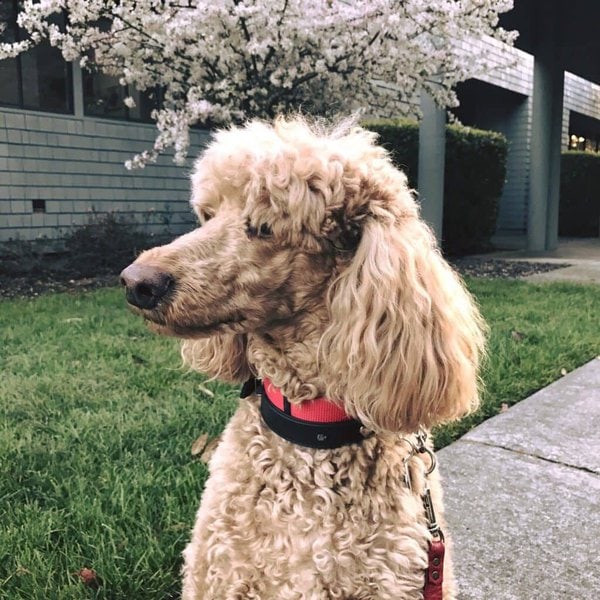
Don’t let their adorable, lapdog-type shape befool you. Poodles make great service dogs.
Poodles can handle a fair share of work, but they were originally bred to be companion dogs. So, besides being smart, poodles tend to be easily bonding, affectionate, and docile pets – the perfect combo of traits required in Autism Service.
For more than usual workload, you’re suggested to go for a medium-to-large sized poodle. Also, their hypoallergenic coat makes Poodles a great allergy detection dog breed.
22. Boxers
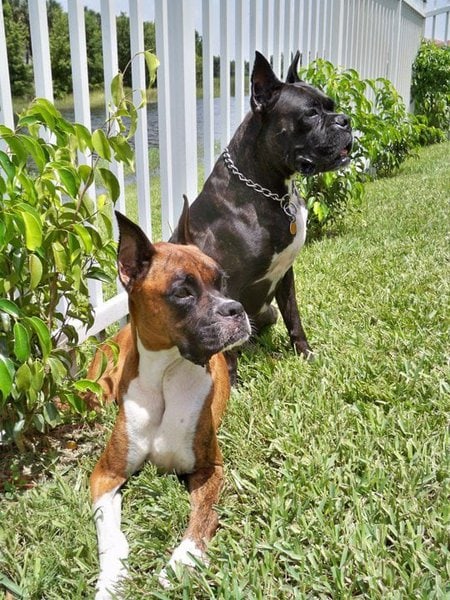
Although Boxers are often ignored for their looks, they have all the required traits to become good service dogs.
Boxers are human-friendly, intelligent, and easily trainable dogs. They can be employed as service dogs for carrying out numerous physical tasks. If not put to task very often, they should be given plenty of exercises.
Being good-natured, Boxers behave well with adults as well as children. Also, Boxers know how to keep their composure in a crowd.
21. Great Danes
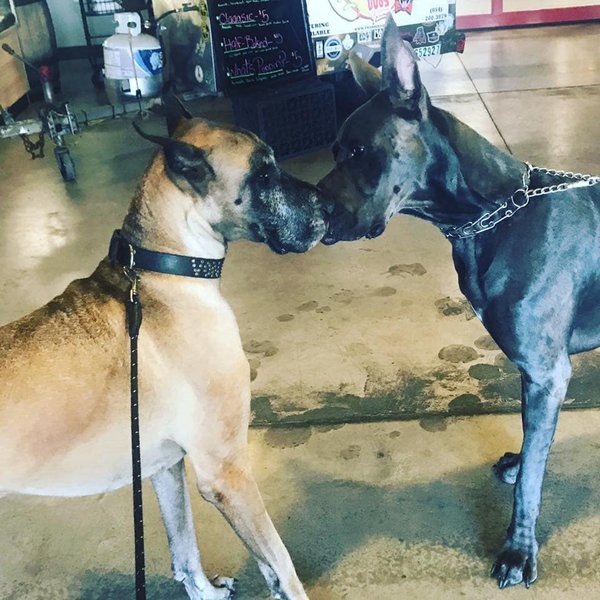
Great Danes are large-sized bongos capable of handling tasks that other dogs might struggle to complete.
Their smart, trainable, and energetic nature makes Great Danes ideal as Mobility Assistance Dogs. They are usually good to strangers, however, might decide to stay focused on their owners instead of showing love to strangers.
Great Danes, although gigantic and dominating in appearance, are actually lovable teddies inside. They are thus often employed as Psychiatric Service Dogs. Among many roles as service dogs, Great Danes are used as fire dogs too.
20. Border Collies
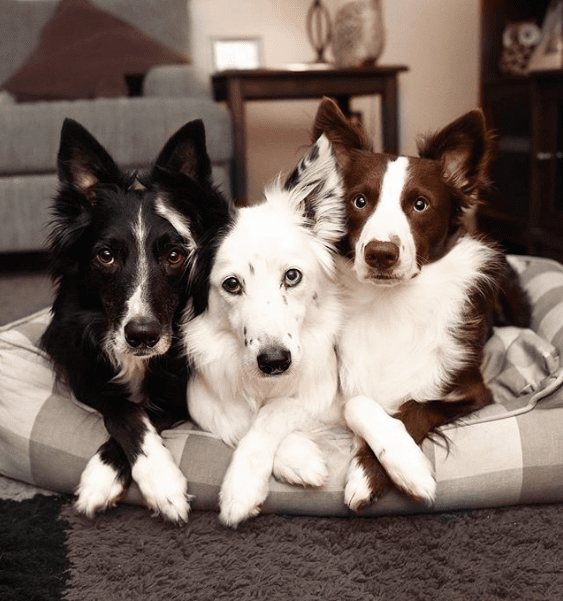
Border Collies are regarded as one of the smartest dog breeds in the world. They’re very intelligent, easily trainable, and thus extensively used as service dogs for multiple tasks.
These bongos love to complete quests for you, however, they might get bored and become mischievous if Border Collies are kept idle for a long time.
With appropriate training, Border Collies make excellent Seizure Alert Dogs. They’re capable of responding appropriately if they detect a seizure.
19. Bernese Mountain Dogs
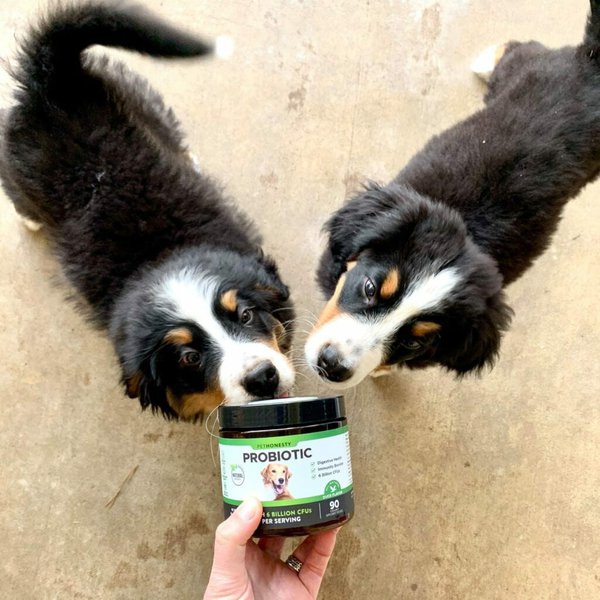
The kind-hearted temperament of Bernese Mountain Dogs along with other important traits such as moral dedication towards work, highly intelligent nature, etc. makes them well-suited for being service dogs.
Bernese Mountain Dogs are low-maintenance dogs needing their double coats to be groomed at least thrice a week.
The unique blend of all the useful traits present in Bernese Mountain dogs enables them to be classified among some of the best Mobility Assistance Dogs as well as Psychiatry Assistance Dogs.
18. Pomeranians

These adorable fur balls, which we call Pomeranians, are not usually taken seriously as good service dogs, but they can be highly beneficial to individuals requiring emotional support.
Also, Pomeranians have been successfully trained to detect high and low blood sugar levels in diabetes patients, thus making for an excellent diabetic alert dog.
When it comes to apartment life, Pomeranians being compactly-sized and docile, are a good choice to go for.
17. Portuguese Water Dogs
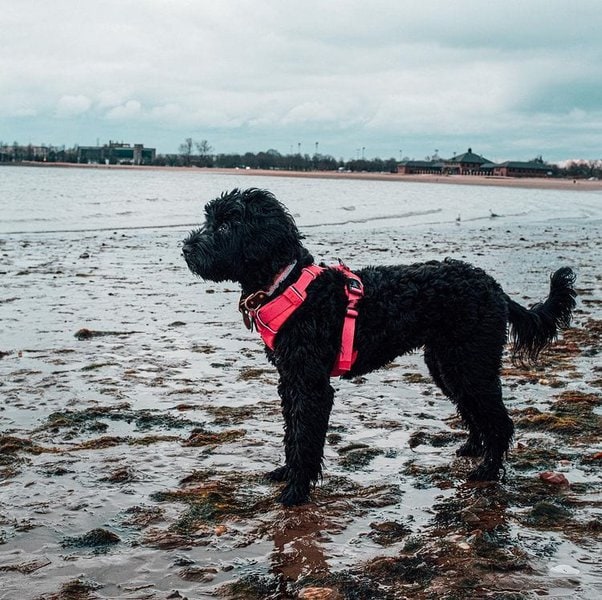
The American Kennel Club classifies Portuguese Water dogs as working dogs. It’s because these stout-bodied, intelligent, and independent bongos are capable of readily learning obedience and agility skills.
Portuguese Water dogs possess soft, fluffy coats that don’t shed easily. All of these useful characteristics make these furry friends excel as hearing dogs, seizure alert dogs, mobility assistance dogs, and therapy dogs.
PWDs are fairly affectionate towards strangers and prefer to stay in proximity to their masters, whether indoors or outdoors.
16. Bloodhound
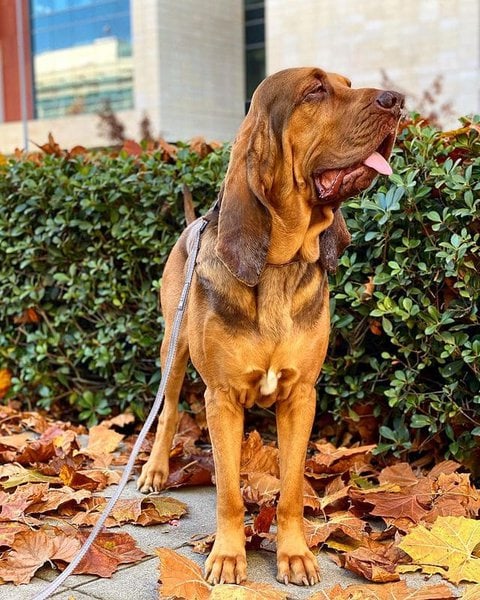
Bloodhounds possess a strong sense of smell, they’ve extra smell receptors in their noses, about 40x times more when compared to humans. Thus, undoubtedly, making them excellent guide dogs, or search and rescue dogs.
Being strong-headed, independent dogs more than the usual amount of persuasion may be needed to train Bloodhounds.
Bloodhounds are used as police dogs, as they help in tracing the criminals. They’ll make excellent companion dogs too, though, you’ll need to bear with their excessive drooling and shedding.
15. Rough Collie
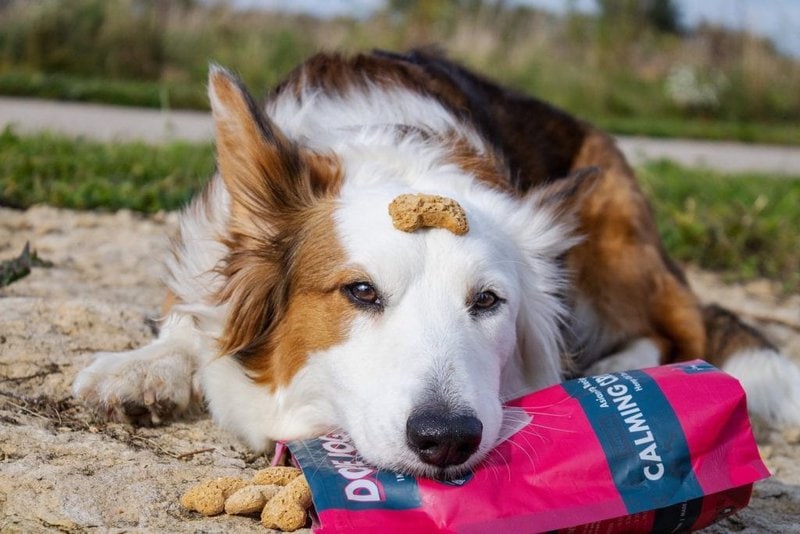
Rough Collies being herding and protecting dogs by their origin, are very empathetic in nature. Although less active than Border Collies, they still require an hour of outdoor activity every day.
We can describe Rough Collies as affectionate, docile, trainable, and intelligent dogs. Besides, being an excellent help to individuals with mobility issues, they make great therapy dogs as well.
The Rough Collie is a family-oriented dog and plays well with children. This bongo is perfect for apartment life.
14. Greyhound
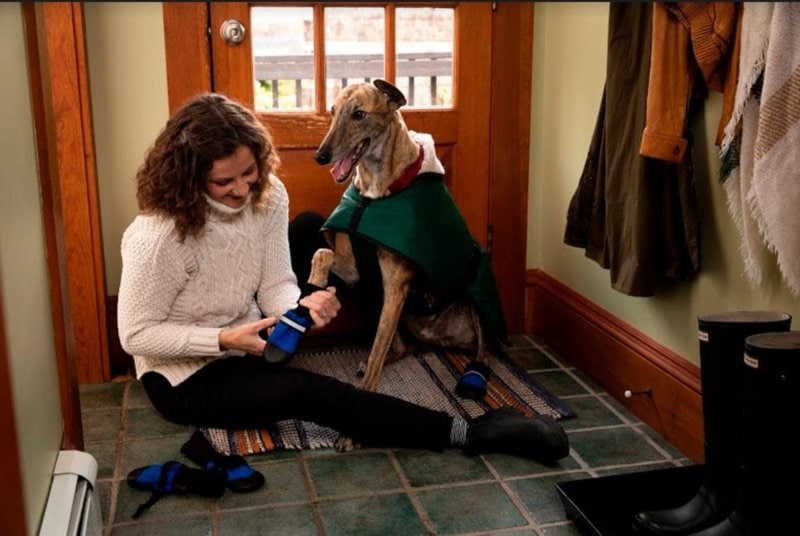
Greyhounds are speedsters with noble temperaments. They’re excellent at socializing with people or even other pets.
The smiling, calm, gentle, and smart nature of Greyhounds make them good as service dogs for multiple purposes.
Greyhounds make excellent pets for families as well as individuals looking for a dedicated companion. They’re great at providing service as mobility assistance dogs and PTSD service dogs.
13. Newfoundland

Newfoundlands are big-hearted, affectionate bongos who’ll make you love your life again. Their calm and docile nature is what makes them excel as service dogs.
This dog breed does an excellent job when it comes to providing mobility assistance. Besides that, Newfoundlands are being used as psychiatric service dogs extensively.
Owing to their large size, great strength, high intelligence, and excellent swimming abilities, they often find use as water rescue dogs.
12. American Staffordshire Terrier
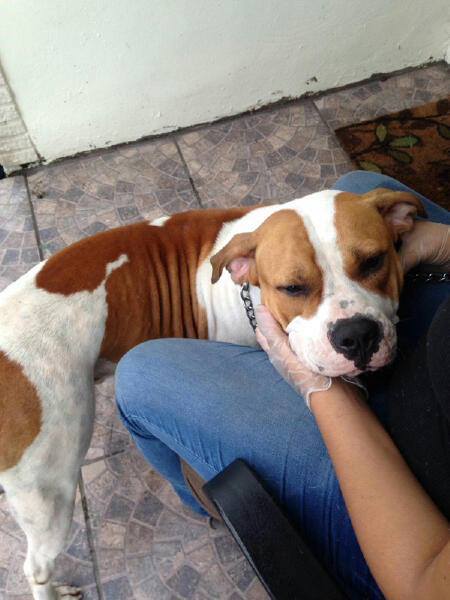
American Staffordshire Terriers are always looking for ways to please humankind. They have a stable disposition that allows them to act normally even in disturbing situations.
After being provided with appropriate training, American Staffordshire Terriers make great therapy dogs and can be employed for providing affection to the needy ones in clinics, hospitals, schools, etc.
The patients suffering from Autism find American Staffordshire Terriers very useful as Autism service dogs, and the same holds true for patients with mobility issues and Down syndrome.
11. Labradoodle
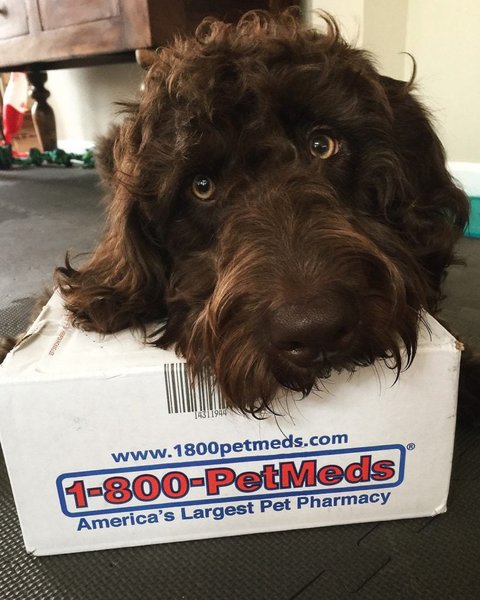
Labradoodle is a hybrid dog breed that was developed by crossing a Labrador Retriever with a Poodle.
The aim of this cross was to arrive at a dog breed that possesses the temperament of Labs and a hypoallergenic coat i.e. an allergy detection dog. Thus, this dog breed is best suited for people who are allergic to dogs and other things.
They do great as service dogs whether it’s about providing service to mobility impaired individuals or people who need emotional support.
10. Belgian Malinois Dog
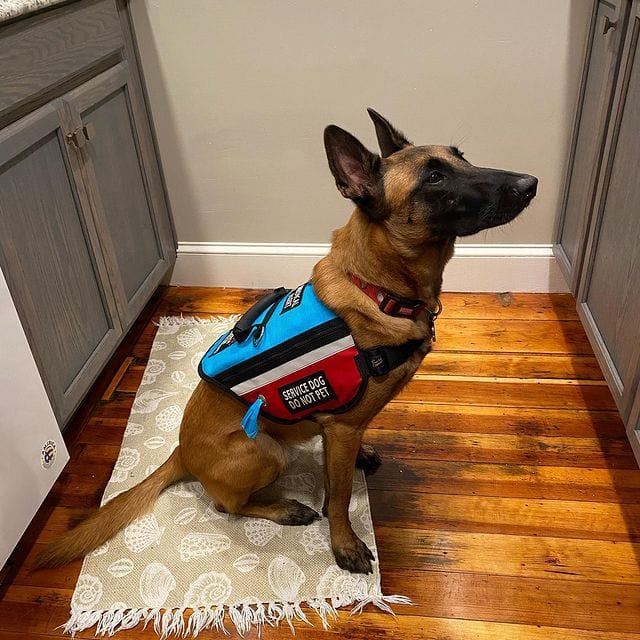
When it comes to PTSD patients, the Belgian Malinois serves as an excellent psychiatric assistance dog breed. These bongos are solid by heart and mind, thus don’t panic easily.
With proper training, Belgian Malinois dogs can attain that stable and calm temperament required in a PTSD service dog.
Their high energy makes Belgian Malinois dogs unsuitable as service dogs for those people who are confined indoors most of the time. However, veterans or non-veterans who are physically active will love their support.
9. Pembroke Welsh Corgi

Pembroke Wesh Corgis are ranked among the most intelligent dog breeds in the world. Their high intelligence makes them get the commands right most of the time.
Though the mischievous nature of Pembroke Wesh Corgis has made them a less favorable choice as service dogs, they are often used as hearing assistance dogs.
Welsh Corgis can be trained to alert their owners of dangers or alarms. They can be taught to give you a gentle nudge whenever your alarm clock goes off.
8. Samoyed
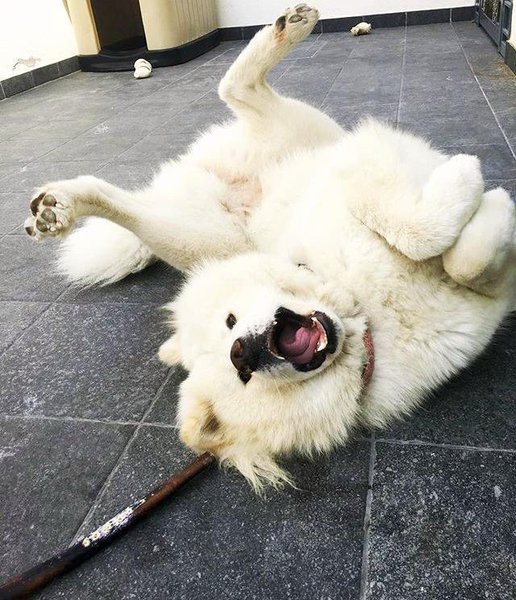
These fluffy, long-haired bongos, although new to the field, have attained great success as service dogs.
Nowadays, Samoyeds are commonly being deployed as emotional support dogs, owing to their intelligence, gentle, and loving nature.
Their curiosity to learn new tasks has made Samoyed famous as a multipurpose service dog. Besides providing emotional help, Samoyeds can also attend to their owner’s hearing needs as hearing assistance dogs, and also harbor excellent socializing abilities.
7. St. Bernard

St. Bernard are children-loving, extremely gentle, slow-moving, and friendly dogs. All they think of is the ways to please their owners.
Although St. Bernards can be heavy droolers at times, they excel at being Autism assistance dogs because of their tolerant and friendly nature.
St. Bernards have a strong sense of smell and thus are also employed as search and rescue dogs. Other than that, they can provide many unique services such as drafting, carting, etc.
6. Lhasa Apso
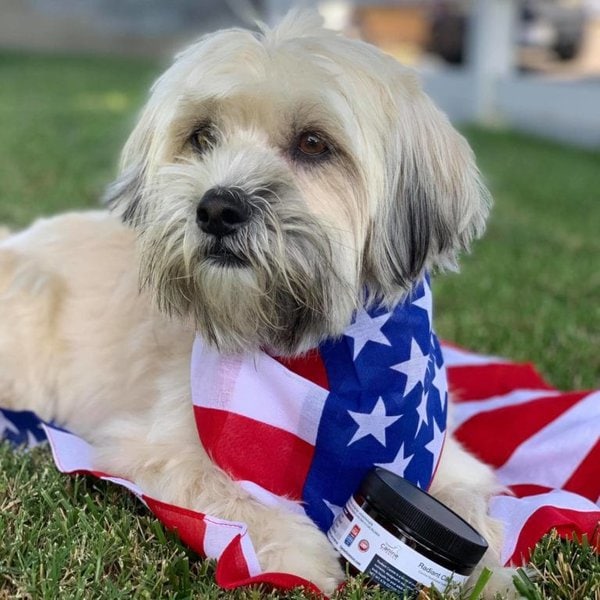
This Tibetan warrior was originally used by the native monks of Tibet to ward off intruders. Thus, they have an alert personality, which makes them wary towards strangers at times.
After providing ample training, Lhasa Apsos perform unparalleled services to their owners as psychiatric service dogs for various mental conditions such as PTSD, bipolar disorder, or depression.
Lhasa Apso is a very loyal, funny, and easily trainable dog. They make perfect pets for individuals looking in search of warm companions.
5. Havanese Dog
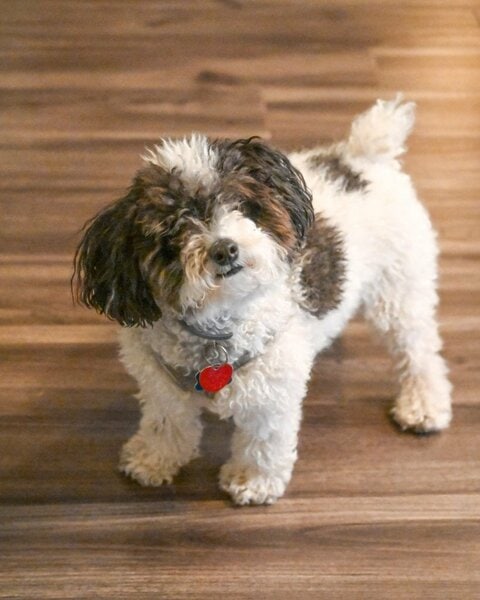
Havanese dogs are all about sharing unconditional love in the form of cuddles and kisses. These furballs have a friendly, playful, and overly affectionate nature, making them great service dogs.
They harbor that strong power of love needed by people suffering from depression or other psychiatric issues. Havanese dogs can be easily trained to provide immense emotional support,
Being miniature in size, loving in personality, and highly intelligent creatures, Havanese dogs are most recommended to render care for children with autism.
4. Dalmatian
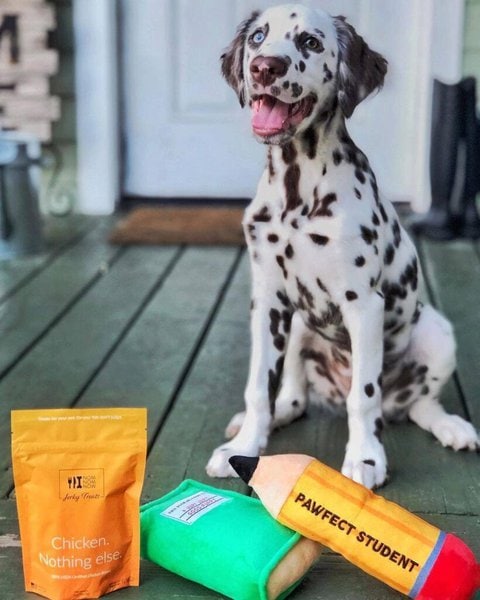
Originally bred to be guard dogs, Dalmatians have an inherent quality of being attentive toward their owners.
Dalmatians are easily trainable and tend to be very protective, thus, could be a good choice as an emotional support dog for people suffering from autism, anxiety, bipolar disorder, etc.
Being very playful in nature, Dalmatians need plenty of exercises to stay in their right mood. Though, to make a good service dog out of a Dalmatian, socialization at the early stages of life is necessary.
3. Beagle

Beagles make great working dogs and emotional therapy dogs, but they don’t do well as mobility assistance dogs.
The affectionate and loving nature of Beagles makes them an ideal dog breed for emotional support. They are great sniffers and are used as working dogs to sniff out drugs, bombs, etc.
Beagles aren’t recommended for people with motor disabilities because they are of miniature size, overly energetic, and tend to get distracted very easily.
2. Rottweiler

Rottweilers are regarded as allrounder service dogs because of their multiple desirable characteristics.
Their sturdy build, large size, and smart mind make Rottweilers excellent as mobility assistance dogs. Of course, training is a must for any dog breed to be a good service dog.
Rottweilers being smart, friendly, and compassionate creatures are also employed in dealing with people suffering from mental and emotional issues. So, a Rottweiler can fulfill the need of a service dog who can cater to physical as well as emotional needs.
1. American Pit Bull Terrier
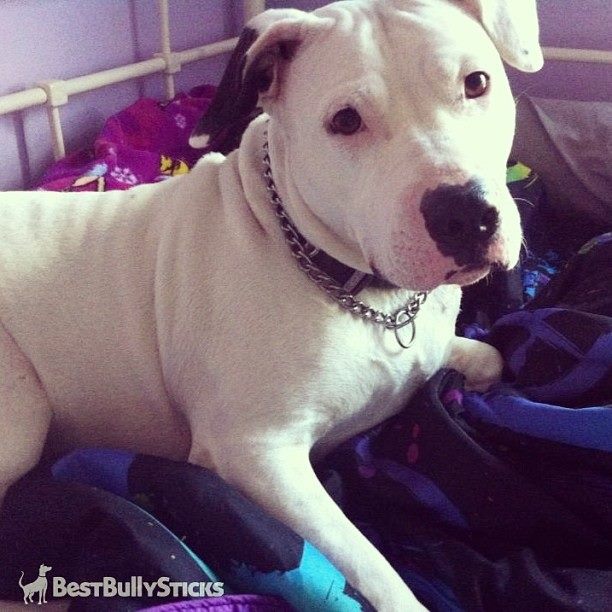
Pit Bulls, although infamous for being dangerous creatures, make good service dogs. The negative perception surrounding them is something you’ll need to get comfortable with.
Pit Bulls are inherently gentle and loving creatures. They have a well-balanced composure which makes them ideal service dogs to have around.
Being stout-bodied, large-sized dogs, they can handle all the physically demanding tasks with ease, be it pulling a wheelchair or something else. They excel at being mobility assistance dogs.
Related Questions
How Long Does It Take To Train A Service Dog?
As per the guidelines issued by the International Association of Assistance Dog Partners (IAADP), it takes a minimum of 6 months to train a service dog, during which 120 hours of training and 30 hours of work in a public setting are a must. The time period required to train a service dog may vary depending on the type of dog breed, the service for which a dog is being trained, etc.
Can You Pick Your Own Service Dog?
Yes, of course! It’s ok for you to choose a service dog that’s well-featured to rectify the shortcomings arising due to your disability. However, it’s recommended to look for a well-trained, preferably certified service dog. Depending on the service you need, you can choose to go for the desired dog breed.
How Can You Tell If It’s A Real Service Dog?
You can rest assured that it’s a real service dog if your bongo shows attentive, disciplined, and stable behavior. Service dogs don’t get easily distracted and mostly stay focused on their work. These traits are exclusive to service dogs and almost impossible to be found in a regular pet.





